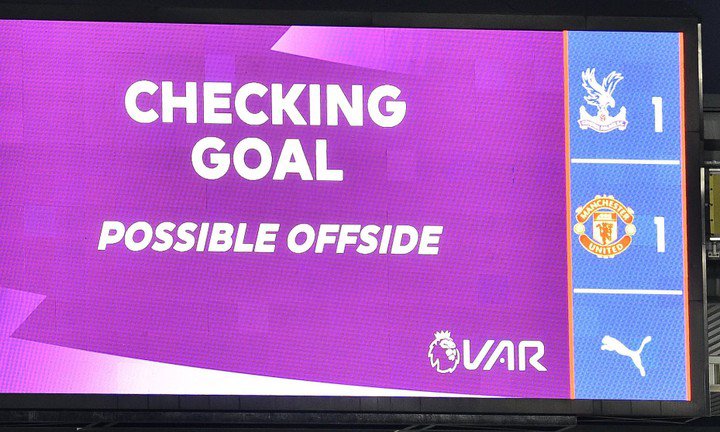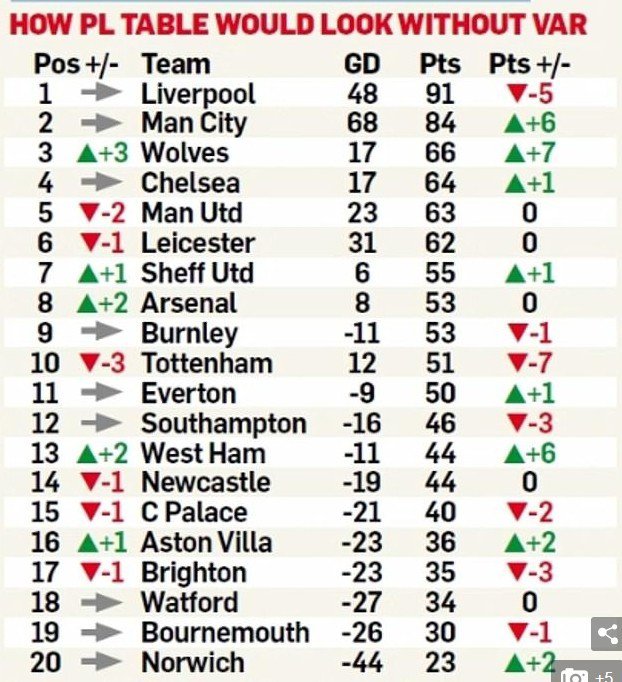Sports
What 2019/20 EPL Table Would Look Like Without VAR
We all knew, before a ball had even been kicked, that this Premier League season would be unlike any other. Even without a pandemic, a three-month hiatus and a quarter of the campaign played in front of no fans, this was going to be different.
The introduction of the Video Assistant Referee (VAR) has had a profound effect on not only the game but the spectacle. Things may never be the same again..

The Mail on Sunday have been at the forefront of VAR and how it has been utilised by Mike Riley’s team of officials at Stockley Park.
Our revelations after the very first game of the season showed that the technology used by the VAR to show Raheem Sterling’s toenail was offside, specifically the frame rates of the broadcast cameras, was not advanced enough to tell for certain if a player was offside at the exact point at which the ball was played.
We are told that more correct decisions have been made but at what cost? Lengthy delays with fans left wondering what is going on, fastidious drawing of offside lines on armpits and an almost unshakable reluctance to use the pitchside monitors.
Even then, penalties that look obvious get overlooked in the name of ‘clear and obvious’ errors..

FIFA have taken control of VAR, the baton passed to them by the International Football Association Board (IFAB), and, with Pierluigi Collina and Arsene Wenger now the key decision-makers, the world governing body want all federations to apply the technology the same way.
That means Riley and the Premier League may be forced to allow their officials to use the monitors more as well as use VAR to check whether the goalkeeper has moved off his line at penalties, which they do not currently do.
Regardless, VAR is here to stay. So, just what has it changed? How different would the Premier League have looked without it?
It has affected more games than not. There have been 216 Premier League games that have included VAR reviews and only 154 without.
Two games, Leicester versus Southampton and Manchester United versus Bournemouth each had five reviews, the most. Of the 334 times VAR has been consulted, the decision was overturned 104 times. That leaves 31 per cent to have been classed as clear and obvious errors.
Decisions affected other clubs more than others. Wolves are the biggest VAR losers.
In another VAR-less world, Nuno Espirito Santo’s side would be set to dust off their passports ready for the Champions League.
As you can see by our ‘Table Without VAR’, Wolves would be third going into the last game of the season needing just a point at Chelsea, or for Manchester United to fail to win at Leicester, to qualify for the Champions League.
In reality, they cannot qualify for the Champions League and face a fight to hold onto sixth place.
Manchester City would be five points better off without VAR, and only seven points behind Liverpool rather than 18, making for a more interesting title fight that Jurgen Klopp’s side would still have won.
At the other end, West Ham would have been safe a lot sooner and Aston Villa would be facing a much easier task on Sunday, though it is also worth remembering the point they were potentially saved by goal-line technology’s malfunction against Sheffield United. Spurs are the team that have gained most from VAR this season, without it they would be seven points and three league positions worse off.
Liverpool would had to have made do with 91 points at this stage instead of 96.
VAR has changed the result of 37 matches, averaging out at one match per round of fixtures.
It has only changed one match from what would have been a loss without VAR to a win however — Liverpool’s 1-0 home victory against Wolves where Sadio Mane’s goal was originally chalked off and Wolves’ equaliser originally stood.
What about the referees? Seventeen officials have taken charge of 10 or more games this season with only five having eight or more decisions overturned by VAR.
Martin Atkinson and his team have had more decisions overturned than any other. Graham Scott is in second place with 11 overturns having refereed 12 games fewer than Atkinson.
Scott averages one overturn every 1.7 games, a league high. Some 21 per cent of the games his team have officiated have had their result changed by VAR’s presence, also a league high.
Throughout the season we were told VAR would stick to a ‘high bar for intervention’. That too appeared to alter during the campaign.
Despite only five overturned decisions in the first 43 games, we saw 18 in 26 matches from December 27 to January 11. Other than that, it was relatively constant.
The rate at which penalties have been awarded by VAR has changed greatly however.
Not a single penalty was awarded by VAR for 92 games before Brighton’s Aaron Connolly was awarded a soft spot-kick against Everton. This was the first of four penalties awarded in eight games.
-

 Celebrity Gossip & Gist2 days ago
Celebrity Gossip & Gist2 days ago“The money wey dem pay me don expire” – Moment Burna Boy stops his performance at the Oando PLC end of the year party (Video)
-

 Economy2 days ago
Economy2 days agoGoods worth millions of naira destroyed as fire guts spare parts market in Ibadan
-

 Celebrity Gossip & Gist19 hours ago
Celebrity Gossip & Gist19 hours agoMoment stage collapses on Odumodublvck during concert performance (Video)
-

 Economy19 hours ago
Economy19 hours agoPresident Tinubu cancels Lagos engagements in honor of food stampede victims




